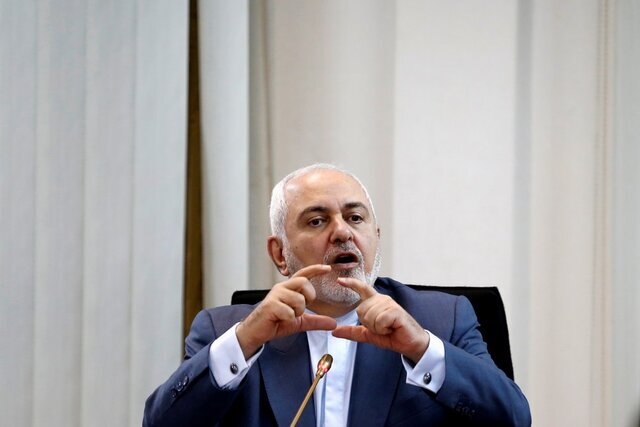Zarif questions Pompeo’s coalition for ‘peaceful resolution’

TEHRAN – Iranian Foreign Minister Mohammad Javad Zarif has questioned U.S. Secretary of States Mike Pompeo’s “coalition for peaceful resolution”, listing eight diplomatic initiatives by Iran since 1985.
For example, Zarif mentioned his “four-point plan” for ending the Yemeni crisis; the “regional non-aggression pact” proposed by him during a visit to Iraq in May, “World Against Terrorism” proposed by President Hassan Rouhani at the UN General Assembly in 2013; and “Dialogue Among Civilizations” by President Mohammad Khatami in 1997 and endorsed by the UN.
These are the list of initiatives Zarif posted on his Twitter account in response to Pompeo:
“’Coalition for Peaceful Resolution’?
Iran’s diplomatic initiatives:
‘85 Security in Persian Gulf
‘97 Dialogue Among Civilizations
‘13 World Against Violence
‘13 Syria Peace Plan
‘14 Regional Dialogue Forum
‘15 Yemen Peace Plan
‘17 Astana Process
‘19 Regional Non-Aggression Pact.”
Pompeo said on Wednesday that Washington is seeking to build a “coalition aimed at achieving peace and a peaceful resolution”. The U.S. plan came after Yemenis’ drone attacks on Saudi oil installations on Saturday.
Zarif has said “ending the war” is the “only solution for all” the disasters following the war on Yemen.
“Ending the war=only solution for all,” Zarif tweeted on September 17.
In April 2015, Zarif submitted a letter to Ban Ki-moon, then UN secretary general, outlining Iran’s four-point peace plan for Yemen.
The plan calls for an immediate ceasefire and end of all foreign military attacks, humanitarian assistance, a resumption of broad national dialogue and establishment of an inclusive national unity government.
Pompeo has claimed Iran was behind the attacks on the Saudi oil plants. Iran has categorically rejected the claim.
Zarif said the United States’ failed policy of maximum pressure on Iran has turned into “maximum deceit”.
“Having failed at ‘maximum pressure’, Secretary Pompeo is turning to ‘maximum deceit’,” Zarif tweeted.
The chief diplomat said blaming Iran for the dangers ensuing the Saudi-led war on Yemen “won’t end the disaster”.
Zarif said the United States is making such accusations against Iran probably because Washington is embarrassed that that advanced weapons that it has sold to Saudi Arabia are failing to intercept drones and missiles launched by the poorly-armed Yemenis.
“Perhaps it's embarrassed that $100s of blns of its arms didn't intercept Yemeni fire,” Zarif wrote on his Twitter account.
Iran’s foreign minister has said the United States and its “clients” in the region are caught in the Yemen quagmire because they suffered from the illusion that possession of sophisticated arms would lead to victory.
Iranian Foreign Ministry spokesman Abbas Mousavi also responded to Washington’s claims, saying, “Such accusations and unfruitful remarks are meaningless within diplomatic framework.”
Mousavi said, “Even in international relations, hostility has some logical framework which has been trespassed by the U.S. officials.”
Iranian government spokesman Ali Rabiei said on Monday that the U.S. claims about Iran’s role in the drone strikes on the Saudi Aramco oil installations were “hasty” and will be harmful to all countries in the region.
“We should see who benefits from such actions. This action is natural reflection of repeated suppression of a society (Yemen),” Rabiei said during a press conference.
NA/PA
Leave a Comment